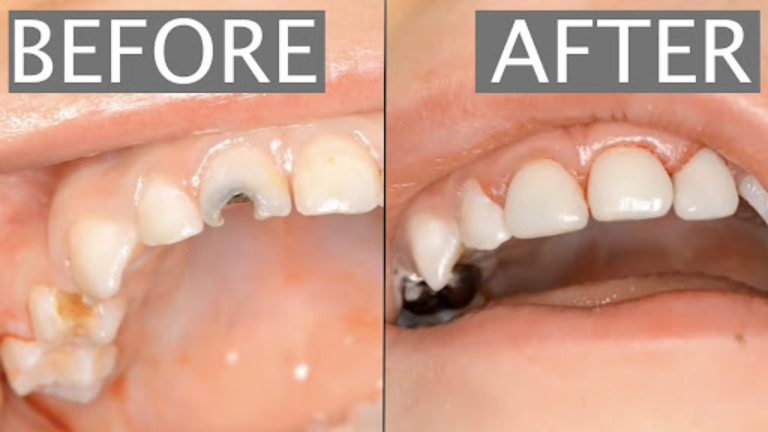Root Canal For Kids: Relieving Pain & Restoring Smiles of Children Worldwide

Finding out that your child has a root canal can make most parents anxious. However, to put your mind at ease and to resolve all queries on root canal in children this blog will prove to be very useful. Children are young and their teeth also require special care. Milk teeth or baby teeth can be treated by root canal and saved. They also may require a crown on top. This crown will remain till their teeth fall out and are replaced with the permanent teeth.
Root canal in kids differs from the adults and must therefore be treated in a different method using different techniques and different materials.

What are the symptoms that denote the need for root canal for kids?
- Intense pain – The child may complain of severe pain. This could be while chewing food or while sleeping at night. They could even have constant dull ache. The pain could also be felt around the ears or below the eyes.
- Difficulty in Chewing – If you notice the child chewing only from one side, it could be due to a severely decayed tooth. They may also complain of food getting stuck while chewing. If it is too distressing, they may refuse to eat solid food and prefer a liquid diet.
- Sensitive Teeth – Refusing to eat an ice cream or complaining of toothache after having hot soup could indicate the need for a root canal. This sensitivity to temperature may reveal an exposed nerve which lies inside the tooth.
- Foul Smell – When the child speaks, they could emit a foul smell. This can be noticed while feeding, talking or brushing with them. The smell could mean that food is accumulating in their teeth. It could also be due to pus accumulation in their mouth.
- Swollen Gums – If there is a swelling seen in the gums which surround a cavitated or black tooth it could indicate that the tooth is infected and requires a root canal treatment. To ensure that the infection is cured completely and bring down the swelling medicines may be given to the child.
- Fever – If left untreated the infection may spread from the mouth to the rest of the body and lead to fever. In such a case first the fever and infection are controlled with medicines before the tooth is cleaned and filled.
- Trauma – Children are often careless and tend to damage their teeth while playing. This could lead to chipping off or loosening of their teeth. When the teeth are broken the nerve gets exposed and root canal may be needed to save the tooth and remove the pain.
Root canal for kids' vs Root canal for adults:
| Root Canal for Kids | Root Canal for Adults |
| Save baby teeth to maintain space | Save permanent teeth from damage |
| Usually shorter | Often longer due to complexity |
| Fewer and simpler canals | More canals, sometimes curved |
| Mild sedation or local anesthesia | Local anesthesia |
| Generally faster | May take longer |
| Temporary, until baby tooth falls out | Permanent, designed to last long |
| Monitor for natural tooth replacement | Routine dental check-ups |
Steps performed during a root canal for kids:
- A preliminary checkup is done and any x-rays if needed are taken under a very low dose radiation exposure.
- The child is sedated, or local anesthesia is given around the region of the decayed tooth.
- The crown of the tooth is cleaned, and all the decayed portion is removed to gain access to the nerve tissue inside.
- The root canals are cleaned properly and filled with temporary medicine or dressing.
- For permanent teeth a permanent filling may be placed in the canals whereas in the case of baby teeth a resorbable filling is done.
- In the next appointment a ready-made paediatric crown may be placed over the root canal treated tooth.
- For milk teeth the crowned tooth must be monitored till it falls off and is replaced by a permanent tooth.

Conclusion:
Visiting the dentist can be very stressful for adults itself so in the case of children it may prove to be even more challenging. Specialist trained to treat milk teeth are known as paedodontists. They are skilled and patient to manage children and treat them effectively. While treating children it is important to keep appointments short and explain things to them simply in a language they will understand. The materials and instruments used for them are different from adults. Their teeth and mouth are smaller and more delicate. It must be ensured that the materials placed are safe for their age and will support the teeth as they resorb and fall out.
If you want to prevent early decay in milk teeth, you can follow the following practices:
- Brush properly twice a day
- Avoid bottle feeding for prolonged periods
- Prevent eating too many sticky and sweet food items
- Make sure to visit the dentist for regular check-ups
At a popular dental setup like Signature Smiles Clinic the dental team and paediatric specialists are well equipped to treat all dental problems that could trouble children.
Common FAQs
- When do kids need root canals? – Children may need root canals due to injuries or severe decay. A fall or sports accident can damage a tooth, leading to infection if the inner tissue is affected. Poor oral hygiene and sugary diets can also cause deep cavities that may require treatment. Only a dentist can confirm if a root canal is needed.
- Are root canals safe for children? – Yes, root canals are safe for children. In fact, if left untreated the tooth may lead to even more serious infections.
- Is root canal painful? – An infected tooth can be very painful for your child. However, a root canal won't be. With local anesthesia or sedation, the procedure is pain-free. Some discomfort after the treatment is normal, and over-the-counter painkiller can help manage it.
- Won’t the milk tooth just fall out eventually? – Baby teeth will fall naturally, but they still need proper care while they are present in the mouth. Losing them early can affect speech & chewing. Keeping baby teeth in place helps prevent misalignment and jaw issues. A root canal can treat infection while preserving the tooth until it’s ready to come out on its own.
